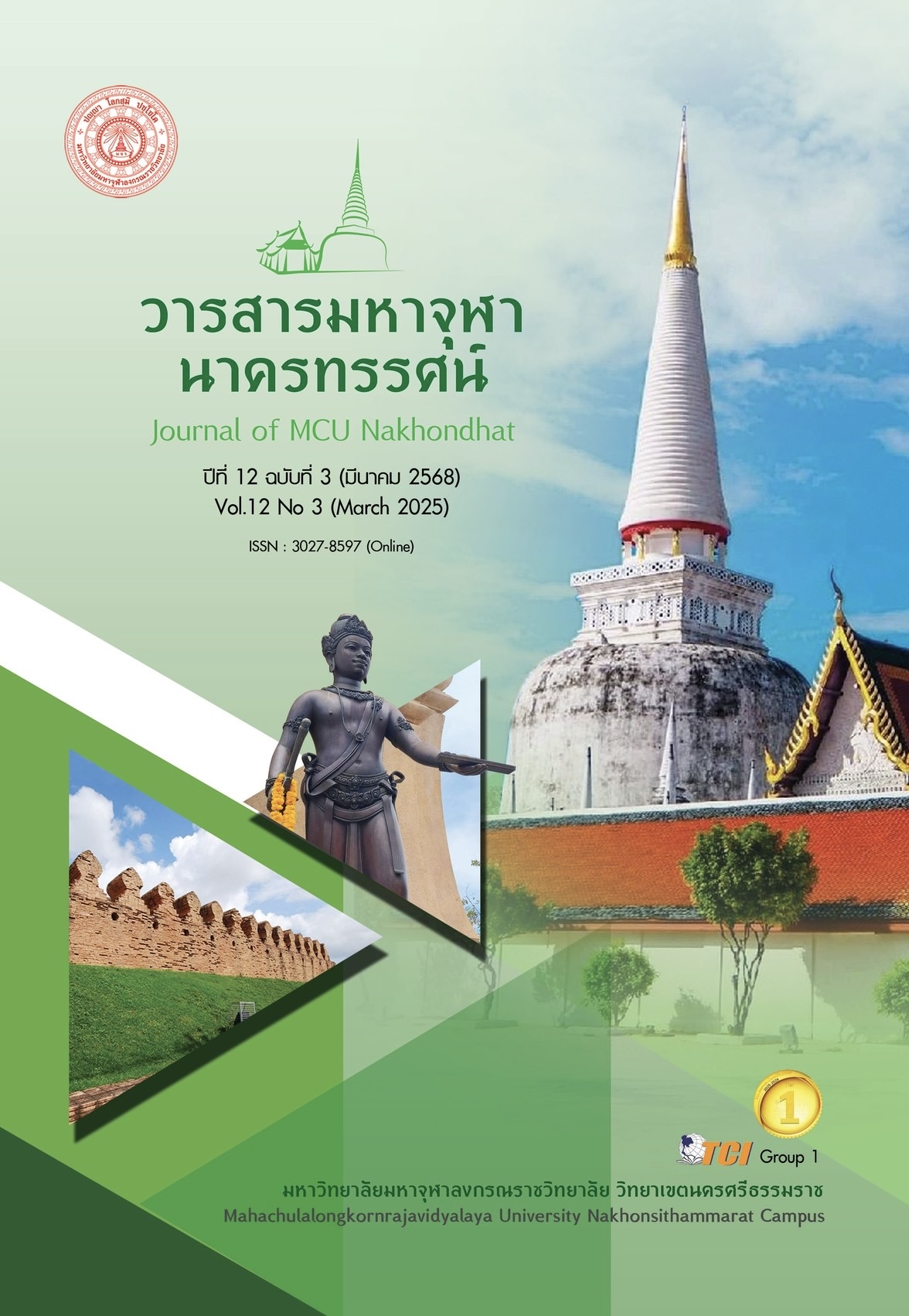DEVELOPMENT OF ELDERLY SCHOOL MANAGEMENT MODEL UNDER THE JURISDICTION OF CHIANG MAI LOCAL GOVERNMENT ORGANIZATION FOR ENHANCING ACTIVE AGING
Main Article Content
Abstract
This research aims to: 1) Examine the current and desired states of elderly schools under the jurisdiction of Chiang Mai local government organization management for enhancing active aging 2) Study the best performance of elderly schools for enhancing active 3) Develop and examine the model of manual for elderly school management to enhance active aging and 4) Evaluate the model and manual for elderly school management to enhance active aging. The sample group consists of 5 people including scholars, individuals working in the field of elderly care, and stakeholders participating in a workshop to validate the components of active aging enhancing model, 9 people to review the model and manual, 18 people to assess the model and manual, and 150 people providing feedback in a questionnaire using Taro Yamane's calculation formula. The research instruments include questionnaires, component synthesis forms, semi-structured interviews, and suitability assessment scales rated on a 5 Likert scale. Data was collected using the developed questionnaires. Research statistics include frequency, mean, and standard deviation, with descriptive analytics. The research findings indicate that the overall current situation is at a high level, while the desired situation is at the highest level. The top three components of active aging enhancement correspond to the concepts of the World Health Organization (WHO), which are health, participation, and security. Meanwhile, lifelong learning, conducive conditions for active aging, and health promotion factors are ranked from 4 to 6 respectively. Best practice includes a group, board, rules or agreements, activities, and funds. The development and review of model and manual of "P-LE-A-R-N" has a verification result of accuracy and appropriateness at 100 percent. The evaluation of the model and the manual for using the model shows that the feasibility is at the highest level, and the usefulness is also at the highest level.
Article Details

This work is licensed under a Creative Commons Attribution-NonCommercial-NoDerivatives 4.0 International License.
References
กรมกิจการผู้สูงอายุ. (2560). คู่มือโรงเรียนผู้สูงอายุ. กรุงเทพมหานคร: กระทรวงพัฒนาสังคมและความมั่นคงของมนุษย์.
ฐาณญา สมภู่ และคณิต เขียววิชัย. (2562). การพัฒนารูปแบบการส่งเสริมภาวะพฤฒพลังของชมรมผู้สูงอายุไทย. วารสารวิชาการศิลปะศาสตร์ประยุกต์, 12(1), 35-45.
ณัฐธินี ศุภนิมิตศิริ. (2563). องค์กรปกครองส่วนท้องถิ่นกับการพัฒนาคุณภาพชีวิตผู้สูงอายุในโรงเรียนผู้สูงอายุ: กรณีศึกษาโรงเรียนผู้สูงอายุตำบลยายชา อำเภอสามพราน จังหวัดนครปฐม. ใน วิทยานิพนธ์รัฐศาสตรมหาบัณฑิต สาขาการเมืองการปกครอง. มหาวิทยาลัยธรรมศาสตร์.
ไทยพับลิก้า. (2567). เมื่อไทยเข้าสู่สังคมผู้สูงอายุอย่างสมบูรณ์ Aged Society ผู้สูงอายุไทยได้รับสวัสดิการอะไรบ้าง. เรียกใช้เมื่อ 10 กุมภาพันธ์ 2567 จาก https://thaipublica.org/2024/02/thailand-becomes-aged-society/
นรินทร์ หมื่นแสน และสุชาดา ไกรพิบูลย์. (2557). การมีส่วนร่วมของชุมชนในการสร้างเสริมสุขภาพของผู้สูงอายุหมู่บ้านทุ่งหลุก อำเภอเชียงดาว จังหวัดเชียงใหม่. พยาบาลสาร, 41(1), 1-12.
นิลภา จิระรัตนวรรณะ และคณะ. (2562). การมีส่วนร่วมของชุมชนในการสร้างเสริมสุขภาพ. วารสารมหาจุฬาวิชาการ, 6(ฉบับพิเศษ), 365-381.
รัตนะ บัวสนธ์. (2562). การวิจัยและพัฒนานวัตกรรมทางการศึกษา. กรุงเทพมหานคร: สำนักพิมพ์ จุฬาลงกรณ์มหาวิทยาลัย.
วรดา รุ่งเรือง. (2562). การพัฒนาคุณภาพชีวิตผู้สูงอายุในโรงเรียนผู้สูงอายุสังกัดองค์กรปกครองส่วนท้องถิ่นเขตภาคกลางของประเทศไทย. วารสารสหวิทยาการวิจัย, 8(2), 249-258.
วิญญ์ทัญญู บุญทัน. (2561). การวิจัยและพัฒนารูปแบบการส่งเสริมพฤฒพลังตามแนวคิดการเรียนรู้โดยใช้สมองเป็นฐานและการเรียนรู้บนความท้าทาย. ใน ดุษฎีนิพนธ์ปรัชญาดุษฎีบัณฑิต สาขาวิชาการวิจัยและพัฒนาศักยภาพมนุษย์. มหาวิทยาลัยศรีนครินทรวิโรฒ.
วีรชน บัวพันธ์. (2561). การพัฒนารูปแบบการบริหารโรงเรียนสู่ความเป็นเลิศด้านการจัดการเรียนการสอนหุ่นยนต์สังกัดสำนักงานคณะกรรมการการศึกษาขั้นพื้นฐาน. ใน ดุษฎีนิพนธ์ปรัชญาดุษฎีบัณฑิต สาขาวิชาการบริหารการศึกษา. มหาวิทยาลัยบูรพา.
เวหา เกษมสุข. (2562). แนวทางการส่งเสริมการเรียนรู้ตลอดชีวิตในโรงเรียนผู้สูงอายุ. วารสารพยาบาลตำรวจ, 11(2), 261-271.
ศศิพัฒน์ ยอดเพชร. (2559). เตรียมพร้อมประชากรรับมือสังคมสูงวัยเต็มรูปแบบหรือยัง? เรียกใช้เมื่อ 5 กุมภาพันธ์ 2567 จาก https://thaitgri.org/?wpdmpro=เอกสารประกอบงานเสวนาวิ-2
สำนักงานกองทุนสนับสนุนการสร้างเสริมสุขภาพ. (2560). สถานการณ์ผู้สูงอายุไทย. เรียกใช้เมื่อ 13 มกราคม 2568 จาก https://www.thaihealth.or.th/?p=182771
สำนักงานแรงงานจังหวัดเชียงใหม่. (2567). สถานการณ์แรงงานจังหวัดเชียงใหม่ 2566. กรุงเทพมหานคร: กระทรวงแรงงาน.
สำนักงานสถิติแห่งชาติ. (2560). ดัชนีพฤฒพลังผู้สูงอายุไทย (Active Aging Index of Thai Elderly). กรุงเทพมหานคร: บริษัท เท็กซ์ แอนด์ เจอร์นัลพับลิเคชั่น จำกัด.
สำนักศูนย์เรียนรู้สุขภาวะ. (2559). ท้องถิ่นรวมใจ ดูแลผู้สูงวัยในชุมชน. กรุงเทพมหานคร: สำนักงานกองทุนสนับสนุนการสร้างเสริมสุขภาพ (สสส.).
สุธีรา บัวทอง และคณะ. (2558). ผู้สูงอายุกับเหตุผลในการเรียนรู้วิธีการเรียนรู้และสิ่งที่ต้องการเรียนรู้. วารสารศึกษาศาสตร์ มหาวิทยาลัยศิลปากร, 12(1,2), 6-17.
อาชัญญา รัตนอุบล และคณะ. (2554). การศึกษาและการเรียนรู้ตลอดชีวิตของผู้สูงอายุไทย. ใน รายงานการวิจัย. มหาวิทยาลัยราชภัฏเชียงใหม่.
อุบล หลิมสกุล. (2555). องค์กรปกครองส่วนท้องถิ่นกับการเตรียมความพร้อมสู่สังคมผู้สูงอายุ. เรียกใช้เมื่อ 5 กุมภาพันธ์ 2567 จาก https://www.dla.go.th/upload/ebook/column/2012/6/2010_5036.pdf
CDC. (2022). Well-Being Concepts. Retrieved December 12, 2024, from https://www.cdc.gov/hrqol/wellbeing.htm#seven
Friebe, J. & Schmidt-Hertha, B. (2013). Activities and barriers to education for elderly people. Journal of Contemporary Education Studies, 1(2013), 10-26.
Jin, B. (2017). The Impact of Participation in Education Programs on Elderly’s Life Satisfaction. Retrieved February 2, 2025, from https://newprairiepress.org/cgi/viewcontent.cgi?article=3895&context=aerc
Pipatpen, M. (2017). Education for the Elderly: A New Educational Dimension for the Learning Society of Thailand. International Journal of Behavioral Science, 12(1), 43-54.
Plácido, A. et al. (2022). Health and Wellbeing in Aging. Retrieved December 12, 2024, from https://pmc.ncbi.nlm.nih.gov/articles/PMC9323310/
Punyakaew, A. et al. (2019). Active Ageing Level and Time Use of Elderly Persons in a Thai Suburban Community. Retrieved December 12, 2024, from https://onlinelibrary.wiley.com/doi/10.1155/2019/7092695
Sheng, Y. et al. (2019). Lifelong Learning and Ageing: Evidence from Singapore. Civil Service Collage Singapore. Retrieved February 2, 2025, from https://knowledge.csc.gov.sg/ethos-issue-20/lifelong-learning-and-ageing-evidence-from-singapore/
Thang, L. et al. (2012). Lifelong Learning Among Older Adults in Singapore. Council for the Third Age (C3A). Choa Chu Kang: Fei Yue Community Services.
Vyasamoorthy, P. (2018). Lifelong Learning for the Elderly (Paper based on a presentation made at 18th AISCCON National Conference, Hyderabad 29th-30th Nov 2018). Retrieved February 2, 2025, from http://researchgate.net/publication/330440512
WHO. (2002). Active Ageing: A Policy Framework. Geneva: World Health Organization.
Zhang, K. et al. (2022). The Promotion of active aging through older adult education in the context of population aging. Retrieved February 1, 2015, from https://pmc.ncbi.nlm.nih.gov/articles/PMC9589353/


